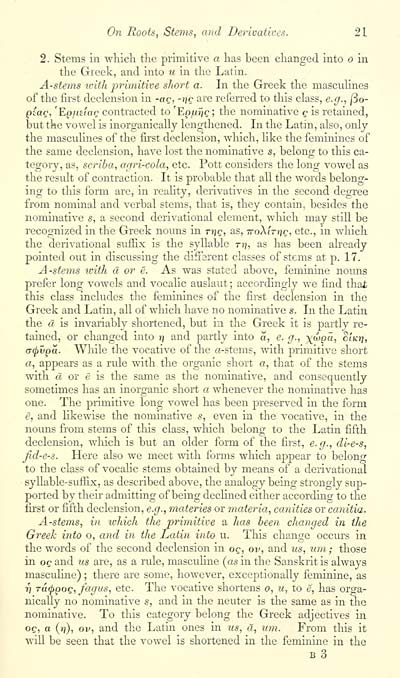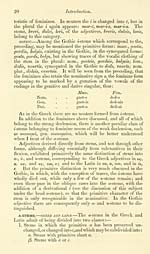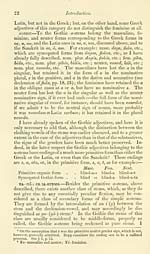Blair Collection > Celtic studies
(51)
Download files
Complete book:
Individual page:
Thumbnail gallery: Grid view | List view

On Roots, Stems, and Derivatives. 21
2. Stems in wMcli the primitive a has been changed into o in
the Greek, and into ti in the Latin.
A-stems icith primitive short a. In the Greek the mascuhnes
of the first declension in -ag, -??c are referred to this class, e.g., /3o-
pc'ae, 'Ep/maQ contracted to 'Epfiijg; the nominative c is retained,
but the vowel is inorganically lengthened. In the Latin, also, only
the masculines of the first declension, which, like the feminines of
the same declension, have lost the nominative s, belong to this ca-
tegory, as, scriha, aqri-cola, etc. Pott considers the long vowel as
the result of contraction. It is probable that all the words belong-
ing to tliis form are, in reality, derivatives in the second degree
from nominal and verbal stems, that is, they contain, besides the
nominative s, a second derivational element, which may still be
recognized in the Greek nouns in rrjc, as, TroAtVrjc! etc., in which
the derivational suffix is the syllable rrj, as has been abeady
pointed out in discussing the diliarent classes of stems at p. 17.
A-stems icith a or e. As was stated above, feminine nomis
prefer long vowels and vocalic auslaut ; accordingly we find thai
this class includes the feminines of the first declension in the
Greek and Latin, all of wliich have no nominative s. In the Latin
the a is invariably shortened, but in the Greek it is partly re-
tained, or changed into jj and partly into a, e. g., xu)Qa, (S/kjj,
(T(f»vpa. While the vocative of the a-stems, with primitive short
a, appears as a rule with the organic short a, that of the stems
with a or e is the same as the nominative, and consequently
sometimes has an inorganic short a whenever the nominative has
one. The primitive long vowel has been preserved in the form
e, and likewise the nominative s, even in the vocative, in the
nouns from stems of tliis class, which belong to the Latin fifth
declension, wliich is but an older form of the first, e. g., di-e-s,
Jid-e-3. Here also we meet with forms which appear to belong
to the class of vocaHc stems obtained by means of a derivational
syllable-suffix, as described above, the analogy being strongly sup-
ported by their admitting of being declined either according to the
first or fifth declension, e.g., materies or materia, canities or canitia.
A-stems, in which the primitive a has been changed in the
Greek into o, and in the Latin into u. Tliis change occurs in
the words of the second declension in og, ov, and us, um ; those
in og and us are, as a rule, mascuHne {as in the Sanskrit is always
masculine) ; there are some, however, exceptionally feminine, as
7] ra(ppog,fagus, etc. The vocative shortens o, u, to e, has orga-
nically no nominative s, and in the neuter is the same as in the
nominative. To this category belong the Greek adjectives in
oc, a (jj), ov, and the Latin ones in us, a, um. From this it
will be seen that the vowel is shortened in the feminine in the
B 3
2. Stems in wMcli the primitive a has been changed into o in
the Greek, and into ti in the Latin.
A-stems icith primitive short a. In the Greek the mascuhnes
of the first declension in -ag, -??c are referred to this class, e.g., /3o-
pc'ae, 'Ep/maQ contracted to 'Epfiijg; the nominative c is retained,
but the vowel is inorganically lengthened. In the Latin, also, only
the masculines of the first declension, which, like the feminines of
the same declension, have lost the nominative s, belong to this ca-
tegory, as, scriha, aqri-cola, etc. Pott considers the long vowel as
the result of contraction. It is probable that all the words belong-
ing to tliis form are, in reality, derivatives in the second degree
from nominal and verbal stems, that is, they contain, besides the
nominative s, a second derivational element, which may still be
recognized in the Greek nouns in rrjc, as, TroAtVrjc! etc., in which
the derivational suffix is the syllable rrj, as has been abeady
pointed out in discussing the diliarent classes of stems at p. 17.
A-stems icith a or e. As was stated above, feminine nomis
prefer long vowels and vocalic auslaut ; accordingly we find thai
this class includes the feminines of the first declension in the
Greek and Latin, all of wliich have no nominative s. In the Latin
the a is invariably shortened, but in the Greek it is partly re-
tained, or changed into jj and partly into a, e. g., xu)Qa, (S/kjj,
(T(f»vpa. While the vocative of the a-stems, with primitive short
a, appears as a rule with the organic short a, that of the stems
with a or e is the same as the nominative, and consequently
sometimes has an inorganic short a whenever the nominative has
one. The primitive long vowel has been preserved in the form
e, and likewise the nominative s, even in the vocative, in the
nouns from stems of tliis class, which belong to the Latin fifth
declension, wliich is but an older form of the first, e. g., di-e-s,
Jid-e-3. Here also we meet with forms which appear to belong
to the class of vocaHc stems obtained by means of a derivational
syllable-suffix, as described above, the analogy being strongly sup-
ported by their admitting of being declined either according to the
first or fifth declension, e.g., materies or materia, canities or canitia.
A-stems, in which the primitive a has been changed in the
Greek into o, and in the Latin into u. Tliis change occurs in
the words of the second declension in og, ov, and us, um ; those
in og and us are, as a rule, mascuHne {as in the Sanskrit is always
masculine) ; there are some, however, exceptionally feminine, as
7] ra(ppog,fagus, etc. The vocative shortens o, u, to e, has orga-
nically no nominative s, and in the neuter is the same as in the
nominative. To this category belong the Greek adjectives in
oc, a (jj), ov, and the Latin ones in us, a, um. From this it
will be seen that the vowel is shortened in the feminine in the
B 3
Set display mode to: Large image | Transcription
Images and transcriptions on this page, including medium image downloads, may be used under the Creative Commons Attribution 4.0 International Licence unless otherwise stated. ![]()
| Early Gaelic Book Collections > Blair Collection > Celtic studies > (51) |
|---|
| Permanent URL | https://digital.nls.uk/75771743 |
|---|
| Description | A selection of books from a collection of more than 500 titles, mostly on religious and literary topics. Also includes some material dealing with other Celtic languages and societies. Collection created towards the end of the 19th century by Lady Evelyn Stewart Murray. |
|---|
| Description | Selected items from five 'Special and Named Printed Collections'. Includes books in Gaelic and other Celtic languages, works about the Gaels, their languages, literature, culture and history. |
|---|

